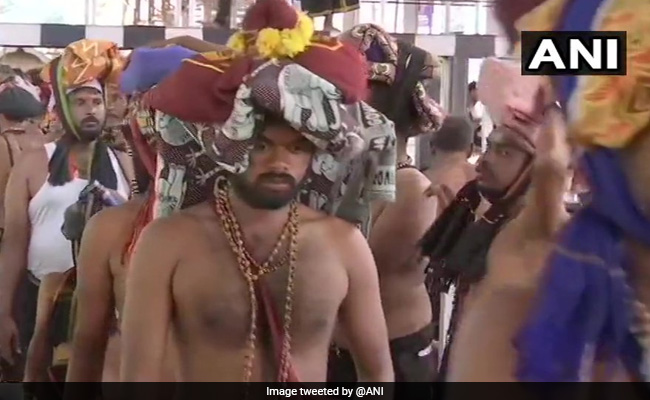As the Sabarimala shrine in Kerala opens today for the 41-day annual pilgrimage season, the Kerala government has said that the shrine is "no place for activism" and the activists hoping to make a statement by taking up the pilgrimage will not be given police protection. The state government is also non-committal about giving protection to women between the age of 10-50 years who were allowed to enter the shrine after the top court last year lifted the centuries-old ban on the entry of menstruating women. The Sabarimala shrine will open this evening at 5 pm two days after the Supreme Court referred the review petitions against its 2018 verdict to a seven-judge bench. Security has been heightened around the hill shrine. More than 10,000 cops will be deployed in four phases.
Here are the LIVE UPDATES as Sabarimala temple opens Today
Women's rights activist Trupti Desai on Saturday said that the Kerala government has refused to provide security to women of menstruating age visiting the Sabarimala Temple and added that the government is working ''completely against'' women.
Ms Desai's statement came soon after at least 10 women, aged between 10 to 50 years, were sent back from Pamba base camp which is nearly 6 km downhill from the temple.
The police did not let the women, who were all residents of Andhra Pradesh, to trek up to the temple.
"Yesterday, the government said that they won't provide security to women, so women are going to Sabarimala Temple without protection. Now, women are being stopped, so I think the government is working completely against women," said Ms Desai, reported news agency ANI.
Activist Rahul Easwar urged feminist groups not to create ruckus in the evening during the Mandala Pooja as he welcomed the Supreme Court's latest order that no protection will be given to women inside the holy shrine.
"This year we hope Mandala Pooja will be peaceful. We request all the feminist groups to not come and create an issue. No devotee should do politics on the same. Supreme Court's order is a welcome move," he said while speaking to news agency ANI in Thiruvananthapuram.
"It is a very sensitive issue. One should wait for the final verdict of the Supreme Court. We will explore the legal technicalities if the verdict will not be in our favour," he added.
The top court on Friday passed an order allowing women of all ages to continue visiting the Lord Ayyappa temple in Sabarimala but stated that the women taking up the pilgrimage will not be given police protection.
#WATCH Kerala: Priests open the sanctum sanctorum of the #SabarimalaTemple. pic.twitter.com/wOhQiv1ErZ
- ANI (@ANI) November 16, 2019
The temple board has echoed the state government's views, adding that it has sought a legal advice after the top court order on Thursday. Travancore Devaswom Board president N Vasu on Friday said, "We don't ask men or women to come to Sabarimala. Devotees come on their own. As we need some clarity on young women entering the temple after the recent Supreme Court order, we have asked for legal advice."
Pune-based women's right activist Trupti Desai, who tried to defy the centuries-old ban on the entry of women of menstruating age to Sabarimala shrine last year too, said on Friday that she will go to the shrine after November 20 even if she is not provided protection by the state government. "I will go to Sabarimala after November 20. We will seek protection from the Kerala government. Even if not provided with protection, I will visit Sabarimala for the darshan," said Ms Desai.

At least ten women of menstruating age were sent back from the Pamba Base Camp this afternoon, according to police sources. The women from Andhra Pradesh wanted to offer prayers at the shrine.
In a statement on Friday, Kerala Devaswom Minister Kadakampally Surendran had said that women seeking protection to visit the shrine will have to get a court order. "This (Sabarimala shrine) is not a place for activism. This is not a place for activists like Trupti Desai to show their strength. Let them go get a court order," he said.
He also told mediapersons to exercise restraint. "Interviewing activists and whipping up a frenzy is not what the media must be engaging in... It is obvious that there will be attempts by certain sections to get some political mileage, but the media shouldn't be party to this," he said.

